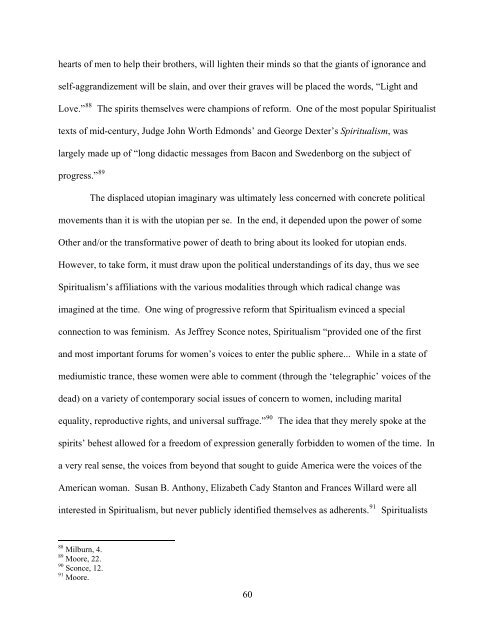A Genealogy of the Extraterrestrial in American Culture
A Genealogy of the Extraterrestrial in American Culture
A Genealogy of the Extraterrestrial in American Culture
Create successful ePaper yourself
Turn your PDF publications into a flip-book with our unique Google optimized e-Paper software.
hearts <strong>of</strong> men to help <strong>the</strong>ir bro<strong>the</strong>rs, will lighten <strong>the</strong>ir m<strong>in</strong>ds so that <strong>the</strong> giants <strong>of</strong> ignorance and<br />
self-aggrandizement will be sla<strong>in</strong>, and over <strong>the</strong>ir graves will be placed <strong>the</strong> words, “Light and<br />
Love.” 88<br />
The spirits <strong>the</strong>mselves were champions <strong>of</strong> reform. One <strong>of</strong> <strong>the</strong> most popular Spiritualist<br />
texts <strong>of</strong> mid-century, Judge John Worth Edmonds’ and George Dexter’s Spiritualism, was<br />
largely made up <strong>of</strong> “long didactic messages from Bacon and Swedenborg on <strong>the</strong> subject <strong>of</strong><br />
progress.” 89<br />
The displaced utopian imag<strong>in</strong>ary was ultimately less concerned with concrete political<br />
movements than it is with <strong>the</strong> utopian per se. In <strong>the</strong> end, it depended upon <strong>the</strong> power <strong>of</strong> some<br />
O<strong>the</strong>r and/or <strong>the</strong> transformative power <strong>of</strong> death to br<strong>in</strong>g about its looked for utopian ends.<br />
However, to take form, it must draw upon <strong>the</strong> political understand<strong>in</strong>gs <strong>of</strong> its day, thus we see<br />
Spiritualism’s affiliations with <strong>the</strong> various modalities through which radical change was<br />
imag<strong>in</strong>ed at <strong>the</strong> time. One w<strong>in</strong>g <strong>of</strong> progressive reform that Spiritualism ev<strong>in</strong>ced a special<br />
connection to was fem<strong>in</strong>ism. As Jeffrey Sconce notes, Spiritualism “provided one <strong>of</strong> <strong>the</strong> first<br />
and most important forums for women’s voices to enter <strong>the</strong> public sphere... While <strong>in</strong> a state <strong>of</strong><br />
mediumistic trance, <strong>the</strong>se women were able to comment (through <strong>the</strong> ‘telegraphic’ voices <strong>of</strong> <strong>the</strong><br />
dead) on a variety <strong>of</strong> contemporary social issues <strong>of</strong> concern to women, <strong>in</strong>clud<strong>in</strong>g marital<br />
equality, reproductive rights, and universal suffrage.” 90<br />
The idea that <strong>the</strong>y merely spoke at <strong>the</strong><br />
spirits’ behest allowed for a freedom <strong>of</strong> expression generally forbidden to women <strong>of</strong> <strong>the</strong> time. In<br />
a very real sense, <strong>the</strong> voices from beyond that sought to guide America were <strong>the</strong> voices <strong>of</strong> <strong>the</strong><br />
<strong>American</strong> woman. Susan B. Anthony, Elizabeth Cady Stanton and Frances Willard were all<br />
<strong>in</strong>terested <strong>in</strong> Spiritualism, but never publicly identified <strong>the</strong>mselves as adherents. 91<br />
Spiritualists<br />
88 Milburn, 4.<br />
89 Moore, 22.<br />
90 Sconce, 12.<br />
91 Moore.<br />
60















